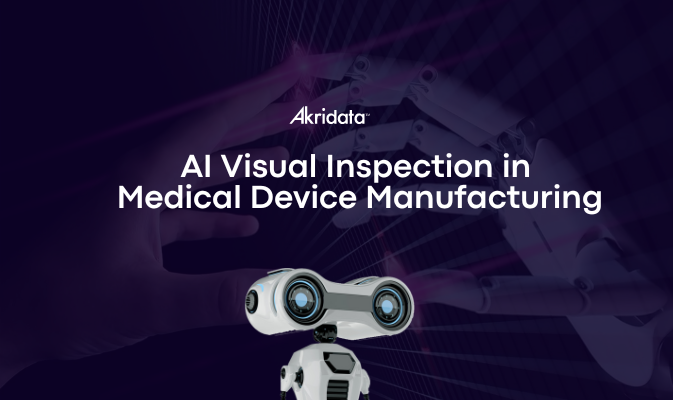AI Visual Inspection: A Cost-Effective Solution for Medical Device Manufacturers
Philips recently settled over 700 lawsuits relating to their line of sleep apnea machines and ventilators. Not only did their payout amount to over one billion dollars, but the company was forced to recall a million of their devices as well.
Why? Poor inspection.
While this might seem like an oversimplification, the fact that machines were fitted with “an industrial foam…that could break down and send potentially dangerous material into the masks worn by users” suggests improper oversight of the quality of the devices. This mistake ended up costing the company a fortune, and, tragically, many of its clients, their lives.
Issues like this are more common than many medical device manufacturers would like to admit. While Philips’ case was more public, plenty of businesses within the industry have faced lawsuits or recalls due to faulty medical devices.
In many cases, these problems could have been prevented with more thorough inspection—something that current manual strategies often fail to provide due to time and resource constraints. However, for companies seeking to avoid the calamities faced by their competitors, there is a more efficient and reliable alternative to manual inspection.
The High Cost of Manual Medical Device Inspection and How AI Can Help
Defects in medical devices are inevitable. However, shipping defective devices doesn’t have to be. Unfortunately, when you rely on manual device inspection, you’re almost guaranteeing that issues will be overlooked—issues for which you will pay the price. If your inspection and oversight tools aren’t up to par—and the primary burden of inspection falls on personnel—you’re inviting human error. In 2023, there were 975 medical device recalls in the United States, resulting in 283 million recalled units, much of which could likely have been avoided by more precise pre-shipment inspection. Who wants to add to that number in 2024?
The issue with these imperfect solutions isn’t just the money you might be forced to pay in lawsuits or recalls down the line. It’s also the effort and time you’re wasting on product inspection that could be done more efficiently by calibrated, task-focused tools. This inefficiency leads to lost potential revenue, damaged reputation, and wasted time and energy.
AI-Powered Inspection Solutions: Overcoming the Challenges of Manual Quality Checks
Manual inspection or quality checks, often performed by end manufacturers, are prone to human error and can create significant bottlenecks due to time constraints, human fatigue, and inevitable mistakes. This is not a criticism of the teams involved but a reflection of the inherent challenges in the industrial-scale production of medical devices.
An alternative approach involves using classical machine learning (ML) solutions, often provided by legacy companies selling machine vision solutions. However, these also come with their own set of limitations. Defects can appear in various parts of a device and in different forms, which classical ML solutions, with their binary approach, often struggle to accurately identify.
To overcome these challenges, it’s possible to develop precise inspection strategies that utilize both existing and synthetic imagery. These strategies can eliminate the need for manual oversight, effectively process device images, and be quickly deployed.
Introducing Akridata: The Future of AI Visual Inspection in Medical Device Manufacturing
Akridata makes oversight and inspection easy. With Akridata, medical device manufacturers can seamlessly integrate the Inspection Studio solution in a modular form. This allows you to collect, curate, analyze, and leverage visual and metadata effortlessly, resulting in actionable, real-time insights that help you spot issues before they become problems. Akridata not only enhances your ability to detect previously unseen damage, but it also improves daily, making your solutions smarter as you gather more data and increasing your ability to utilize it effectively.
Akridata’s Inspection Studio: Enhancing Accuracy and Compliance in Medical Device Production
Akridata’s Inspection Studio comprises three modular building blocks, each of which can be independently utilized or seamlessly integrated depending on the customer’s environment and preference:
- AkriEdge: This edge computing solution connects with cameras, vision sensors, and PLCs to deploy state-of-the-art vision models, collect, and filter relevant data seamlessly.
- Visual Data Copilot: An interactive workbench for data scientists and subject matter experts for exploring visual and sensor data, surfacing anomalies, uncovering latent information, and synthesizing and annotating data for model training and analysis.
- AkriMonitor: To ensure sustained reliability of the inspection solution, AkriMonitor provides a systematic method for identifying drifts in the manufacturing process and model predictions. It also offers an auditable record of model versions, training data, exception handling, and overrides performed in manufacturing lines to meet regulatory compliance and standards such as ISO 13485.
Benefits of Akridata’s Inspection Studio
Adopting Akridata’s Inspection Studio offers several key benefits for medical device manufacturers:
- Enhanced Accuracy: AI-powered inspection reduces human error, ensuring more reliable detection of defects.
- Efficiency: Automated processes save time and resources, allowing for faster production cycles.
- Scalability: Akridata’s modular approach can be scaled to meet the needs of any manufacturing environment.
- Compliance: The system helps maintain compliance with regulatory standards, providing an auditable record of inspections.
- Continuous Improvement: AI models improve over time with more data, enhancing their accuracy and reliability.
In the medical device industry, error is unacceptable. It carries heavy financial and reputational penalties, and above all, it risks the safety of the patient. A defect in a device can be seen as a defect in a brand.
Ready to Protect Your Brand and Patients?
If you take your business seriously, you need to take your inspection process seriously. Akridata does, and we’re here to help.
Learn how Akridata’s AI solutions can revolutionize your inspection process today!



No Responses